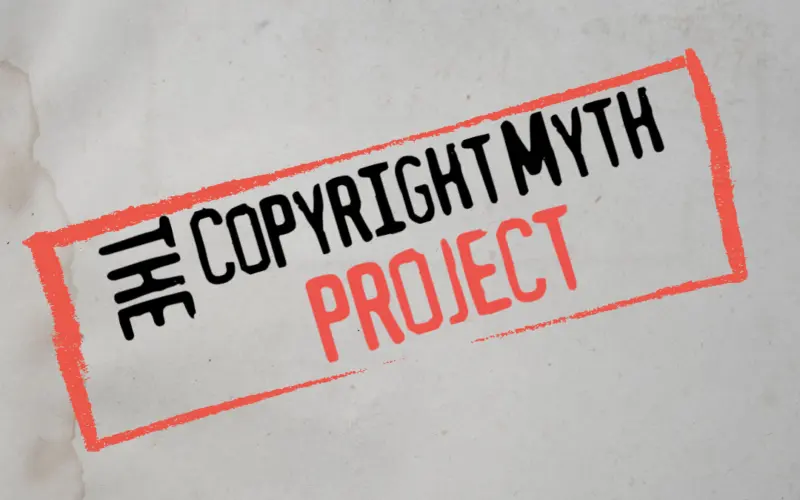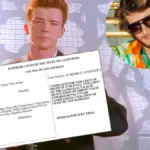Plotting the world’s longest list of common misconceptions about copyright law.
UPDATED on September 25, 2021
Copyright isn’t the type of subject that generally lends itself to clickbait. That said, I’ve noticed a number of online articles purporting to go full-on “MythBusters” to expose various copyright-related fallacies.
Three Dangerous Copyright Myths Debunked!
Four Copyright Myths That Can Destroy Your Business!
Seven Copyright Myths That Can Destroy Your Marriage!
You get the idea.
Well, if there’s one thing i can’t resist, it’s a meaningless challenge that offers no financial reward or any external validation whatsoever. Therefore, I’m officially launching Copyright Lately’s “Copyright Myth Project. “The goal here is to come up with a list that at all times contains at least one more copyright myth than any other article on the internet.
So, without further ado, I present a handy alphabetized list of copyright misconceptions. Please add any others you can think of in the comments. I’m going to need your collective help on this—especially if a certain 14-myth guy out of the U.K. decides to expand his article.
27 Biggest Copyright Myths and Counting
Copyright Notice
Copyright notice hasn’t been required since 1989. Yet I have one on the bottom of this page, as do most other websites, books, and movies. Why do we still use them? Who knows. Maybe we’re stuck in the eighties. Maybe it’s because they look cool and frighten away would-be infringers. Kind of like carrying garlic if you happen to run into a vampire. Plus, they’re free. Here, take a few for good luck: ©©©©©©©©©©
Credit, Curing Infringement by Giving
You should give credit to whom credit is due. According to Dictionary.com, this phrase was coined by Samuel Adams back in 1777. See what I did there? I gave credit to Dictionary.com and I taught you something about Samuel Adams that doesn’t relate to either the American Revolution or to beer. Anyway, while you should give credit because it’s the right thing to do, doing so won’t legally absolve you of an otherwise valid infringement claim should the copyright owner come calling.
Declaration of Fair Use

You may have seen bad advice like this on YouTube, so let’s clear it up: If your content qualifies as fair use, it’s legal to post it. But if it doesn’t qualify, simply asserting that it’s fair use is legally meaningless and certainly doesn’t “guaranty” that you won’t receive a takedown notice.

Educational Uses
In addition to the traditional fair use factors, the Copyright Act contains a number of provisions that allow teachers and other educators to make certain uses of copyrighted works in classrooms (17 U.S.C. § 110(1)) and distance education settings (17 U.S.C. § 110(2), the TEACH Act). The Copyright Office has also published guidelines to help teachers and faculty decide how to best apply fair use when teaching. But, contrary to popular belief (even among some teachers), not all “educational activities” qualify as fair use. While copying a short poem may be okay, a professor can’t make copies of an entire textbook to save students money—even if that would make her very popular.
Enforcement of Copyright to Maintain Protection
If you don’t take legal action against copyright infringers, will you lose your rights? No. There are plenty of good reasons to go after infringers, but abandonment isn’t one of them. This copyright myth seems to come from a similar concept that does apply to trademarks, but frankly, even there you don’t need to pursue each and every infringer. So, if you have a fear of abandonment, you may want to see a therapist, but you don’t need to consult with a copyright lawyer.
Five Second Rule
Some people think that if you use less than five seconds of someone else’s copyrighted work, it’s fair use. Some people also think that if dropped food stays on the floor for less than five seconds, it’s safe to eat. Are they right? Maybe, but it’s certainly not because of any bright-line rule. How significant are the five seconds you used? How dirty is the floor? In either case, do you really want to find out?
Government Works
A work prepared by an officer or employee of the U.S. federal government is not entitled to domestic copyright protection and is considered to be in the public domain under the U.S. Copyright Act. But be careful: that work may still be subject to copyright protection in foreign countries. In addition, the federal government may also own works prepared by independent contractors on its behalf, as well as works that are the subject of third-party assignments. Also, works of state and local governments may be subject to U.S. copyright protection. While some states have dedicated their government works to the public domain, others are reportedly looking to shop the movie rights. Those state budgets aren’t just going to balance themselves, right?
Historical Facts
Facts aren’t protected by copyright law, which means that historical facts aren’t protected by copyright law. In the Feist case, the U.S. Supreme Court squarely rejected the “sweat of the brow” theory of copyright protection. This means that no matter how long and hard you toil away trying to figure out who’s actually responsible for the Kennedy assassination, you can’t use copyright law to keep others from publishing your underlying findings. Sorry about that. You might still be able to get a guest spot on Anderson Cooper though.
Ideas, Protection for
If I had a dollar for every time one of my friends said “I have this great idea for a new reality show I want to copyright!” I’d have at least eight dollars. That may not seem like much, but I don’t have many friends. Repeat after me: copyright does not protect ideas. It only protects the expression of ideas. Besides, that funeral service-speed dating concept you came up with isn’t very good anyway.
Intent to Infringe or Lack of Intent
Civil copyright infringement is a strict liability offense, which means that the lack of intent to infringe is not a defense. The often misunderstood “innocent infringer” concept only comes into play when the plaintiff is seeking statutory damages. A court may—but isn’t required to—reduce these damages to as low as $200 per infringed work. Also, the provision doesn’t apply unless the infringer “was not aware and had no reason to believe that his or her acts constituted an infringement of copyright.” Remember that cool-looking copyright notice we talked about earlier? Guess what? Now you have reason to believe.
International Copyright Law

I’m not going to go into every misstatement packed into this 20-word tweet. I’m focusing here on the widely held belief that, outside of the United States, there is some sort of “international copyright law” presided over by a Justice League-like tribunal. Copyright protection depends on the particular national laws of each country, and while there are certain treaties and conventions that may apply to multiple countries, there’s simply no such thing as international copyright law. So don’t assume that just because a work is in the public domain in one country it’s free to use everywhere.
Internet, Content Found on
There are still some people who think that copyright laws don’t apply to the internet, or that once someone posts something online, it’s in the “public domain.” There’s no question that sharing and copying internet content is easy, but just because something is easy doesn’t mean it’s legal. Just ask that guy who was arrested for taking candy from a baby. Or the one who was caught shooting those fish in that barrel.
Letters, Copyright in
If someone sends you a letter they’ve written, you own the letter. You can sell it, lend it to a museum for exhibition, or use it to make a paper airplane. But contrary to popular belief, you don’t own the copyright—which means you may be prevented from reproducing or publishing the letter without the writer’s permission. In the eighties, reclusive author J.D. Salinger won a lawsuit to stop his unpublished letters from being published after the court rejected the defendant’s fair use argument. And just last year, Meghan Markle sued the U.K. tabloid The Mail on Sunday for publishing a private letter she sent to her father. Fair use may protect you, but be careful.
Names, Copyright in

I hate to break it to everyone who writes things like this on Twitter, but copyright doesn’t protect names. And for the record, no, Kylie Jenner didn’t try to copyright the name Kylie. It was a trademark application, which apparently Kylie Minogue wasn’t too happy about.
Non-Commercial Use
There is no “non-commercial exemption” from copyright law. The fact that you’re not making money off of someone else’s copyrighted work may tip the scales toward fair use, but it’s not automatic. Maybe it’s ok, and maybe it’s not. And maybe you’re just not a very good businessperson. Ever think of that?
Non-Fungible Tokens / NFTs
Congratulations! You just paid $320,000 and are now the proud owner of an NFT of Homer Simpson merged with Pepe the Frog. So what do you get for all that money (other than children who can no longer afford college)? While I suppose you’d have bragging rights at Comic-Con, you probably didn’t receive any ownership interest in the underlying artwork or the digital asset itself. And you almost certainly haven’t acquired any copyrights. Without a valid copyright transfer—which isn’t typical—the original artist retains the copyright in the art. And the NFT itself isn’t subject to any sort of copyright protection at all—it’s just a record of ownership and the link to the digital asset. But hey, you only live once, right?

Notarization
I’ve had lawyers tell me that copyright mortgages and short-form assignments aren’t effective unless they’re notarized. Not true. Documents recorded with the Copyright Office don’t need to be verified by a notary any more than they need to be signed in blood. That said, it’s not necessarily a bad idea to follow this copyright myth because a notary acknowledgment will constitute prima facie evidence of the execution if the transfer is ever challenged.
Orphan Works
Just like orphan children are a staple of fairy tales, orphan copyrighted works are a staple of copyright myths. They are works whose owners can’t be readily identified or located. As a result, there’s no one to ask for permission when someone wants to use one of these works. While several bills have been introduced over the years to address the issue, the only one that has passed so far has been limited to old sound recordings. So, use orphan works at your own risk. Their parents may just show up with a lawsuit.
Photographs, Copyright in
Under U.S. law, the copyright in a photograph is generally owned by the person who took the photo, not its subject. Therefore, unless the photographer has given you express permission (or an implied license), you could be sued for posting a picture of yourself on social media. Don’t believe me? Just ask Jennifer Lopez. Or Kim Kardashian. Or Khloe Kardashian. Or Emily Ratajkowski. Or Justin Bieber. Or Katy Perry. Or my cats Opie and Wanda, who still haven’t responded to my cease and desist letter. If you’re interested in learning more about the potential legal implications of reposting photos on social media, check out my recent post on the topic.
Physical Objects, Possession of
Just because you own a physical object doesn’t mean you own the copyrighted work embodied in the object. The copyright needs to be transferred by the owner separately. Keep this in mind if you were thinking about defraying the cost of that million-dollar painting by selling copies of the artwork on posters and beach towels.
Plagiarism
If you’ve spent any time roaming the halls of Twitter University, you might see people using the terms “infringement” and “plagiarism” interchangeably. But while copyright is a creature of law, plagiarism is all about ethics and social norms. Broadly defined, plagiarism occurs when you take someone else’s original work—even if it’s an idea or otherwise “unprotectable”—and pass it off as your own. For example, if I were to publish “Tom Sawyer” under my name, I’d be plagiarizing Mark Twain. I’d also look like a complete idiot. But I wouldn’t be committing copyright infringement, because the book is in the public domain. Conversely, if I were to reproduce and distribute unauthorized copies of “Harry Potter” by J.K. Rowling, I wouldn’t be engaging in plagiarism. But, as we discussed above, the fact that I credited the author wouldn’t prevent her for suing me for copyright infringement. I would also, once again, look like a complete idiot.
Poor Man’s Copyright
The “Poor Man’s copyright” is where you save yourself a few bucks by forgoing a federal copyright registration and instead mailing yourself a copy of your work. You hold on to the sealed envelope until someone infringes your copyright and, voila, irrefutable evidence of your prior creation. It doesn’t work. One reason is that, in order to dramatically unseal your envelope in open court to an awaiting jury, you first need to file a lawsuit for infringement. And in order to file a lawsuit, you need a copyright registration. Plus, you have copyright protection in a work from the moment you put pencil to paper, so if you aren’t going to pay for registration, you might as well save yourself a stamp too.
Public Domain
Just because a work is in the public domain in the United States doesn’t mean it’s in the public domain everywhere. Every country has its own copyright laws, and if a work was first published outside of the U.S., it may still be protected in its “source country.” Albert Einstein’s paper describing the theory of relativity was first published in Germany in 1916, followed by an English translation in 1920. The original paper is in the public domain in the U.S., but will be protected in Germany until the end of 2025—seventy years after Einstein’s death.
Registration, Requirement of
This misconception works both ways. It’s a myth to say that copyright registration is legally required for copyright protection. But it’s also a myth to say that copyright registration isn’t necessary. Unless you register, you can’t file a lawsuit. And unless you register before your work is infringed, you usually can’t get statutory damages or attorney’s fees upon winning your case. So, practically speaking, you should register your copyright. You should also register to vote.
Visual Arts, Works of
If you’ve made it this far, you know that you can own a physical object without owning the underlying copyright. But just because you own that particular object doesn’t necessarily mean you can do whatever you want with it. If you destroy a work of “recognized stature” that qualifies for protection under the Visual Artists Rights Act (VARA), you could be liable for big damages. Don’t believe me? Just ask the real estate developer who was ordered to pay $6.75 million in damages after he willfully whitewashed 45 works of graffiti art at the 5Pointz property in Queens. They say that one person’s art is another person’s garbage, but that’s some pretty expensive garbage. Check out some of my articles on VARA cases involving cheese walls and trashed tote bags.
WGA Registration

The Writers Guild of America is great for a lot of things. Unfortunately, its script registration service isn’t one of them. Many a writer has found out the hard way that registering a screenplay with the WGA doesn’t take the place of a U.S. copyright registration. A WGA “Document of Registration” really just gives you a record of submission and a certificate you can show to any easily impressed friends. It doesn’t provide proof of ownership, and it doesn’t give you the ability to file a copyright lawsuit in court. Worse yet, if you don’t learn about any of this until after your script has been infringed, you’ll lose the ability to collect statutory damages and attorneys’ fees once you do submit a proper registration.
Works Made for Hire
One of the most misunderstood copyright concepts has to do with who owns a copyrighted work that you hire someone else to create. If the work is created by one of your employees acting within the scope of his or her employment, you, as the employer, automatically own the copyright. However, if you hire an independent contractor, you will only own the copyright as a “work made for hire” if you enter into a written agreement with the creator and the work falls within one of the nine categories listed in the Copyright Act. Certain types of works, such as photographs, do not qualify unless they are part of a collective work or compilation.
Note that in the absence of a work for hire, the creator can still assign his copyright to you, but that assignment will be subject to termination after 35 years and will have a different duration. This an area in which you should consult a copyright lawyer because even sophisticated parties get tripped up over works for hire.
Your Turn!
Please comment below and help me add to the list!







22 comments
Here are some that I’ve encountered:
– Plaigiarism, Difference from Copyright (corollary to Credit, Curing Infringement by Giving) – the words are often used interchangeably, and generally incorrectly
– under International Copyright Law you could add that some things might be in the public domain in other countries but not the U.S. (because the other country’s copyright term is shorter, and/or because of the Copyright Term Extension Act which placed some formerly public domain works back under copyright)
– Government Copyright – federal government works are in the public domain, not so for all the states, and not necessarily so in other countries
– Photographs, Copyright in – just because someone takes a picture of you, it does not give you any special copyrights in it (unless you agreed so beforehand) – (this has come up a lot lately with celebrities posting things on their social media; even Brian May, Ph.D., made the mistake and caused a bit of a row on his Instagram page)
Lisa – These are fantastic ideas and I’ve added them all. Let me know what you think – and thanks so much for contributing!
Aaron
fantastic article
agreed
Hey! This was so fun to read and brushed all my concepts on Copyright Law. I discovered this blog today and it has been a delightful couple of hours exploring this blog and its engrossing writing. Kudos!
Hi Devangini,
Thank you so much for reading! I hope you’ll visit often and subscribe to the weekly newsletter.
Best,
Aaron
Aaron, excelent article!
In Spain I often hear the misconception about “You may use 5 seconds, 5 compases, 5 notes or 5 whatever pieces of someone else’s music without being an infringement”. This may come from the laws in some countries (Argentina I believe) which have such rule.
Maybe you can illustrate the comment on the posession of physical objects with cases like the 5 Poitz graffiti in NY
https://www.nytimes.com/2020/10/06/nyregion/graffiti-artists-5pointz.html
Thanks Enric! I added VARA as separate entry. You know, for longer list reasons and all.
I’ve had some clients who arrive under the impression that if the use is not for profit, they are exempt from getting a license to use copyrighted works. As far as I know, this is not the case. Not even close.
Yep, this one is already in the list under “Non-Commercial Use.”
This is sort of related to the non-commercial use one, but many people think that all educational uses are automatically considered fair use.
Thanks Colleen – added!
Any thoughts on NFT’s?
Hi John,
I think NFTs will end up being a great way to sell things like digital music and concert tickets, but I’m less optimistic about the long-term prospects for the folks investing in supposedly “rare” items like digital artwork. There’s also a lot of misinformation floating around out there as to what buyers are actually getting for all that money. It’s usually nothing more than a sort of “digital certificate of authenticity,” as opposed to any rights in the underlying copyrighted work. I’ll add something to the list on this point when I get a chance. Thanks for the note!
Sort of an offshoot of “historical facts” but I get calls from people who say that a movie is based on their life or something true that happened to them. It’s not copyright infringement, and, as we learned in the Sandlot and Hurt Locker cases, probably not a tort at all.
So this one is sort of the reverse of the “five second rule”: Lots of books, academic papers, etc. will include some disclaimer saying “no part of this may be copied, reproduced, etc. without express permission from publisher” or something like that. I’ve seen different disclaimers which sometimes include “unless allowed by law” or on occasion explicitly listing 107 & 108. This one just came on my radar, and is boiler plate for NBER papers. “© 2021 by Pablo Fajgelbaum and Amit Khandelwal. All rights reserved. Short sections of text, not to exceed two paragraphs, may be quoted without explicit permission provided that full credit, including © notice, is given to the source.” https://www.nber.org/system/files/working_papers/w29315/w29315.pdf
Hi
Great to know some of these truths.
Firstly, it seems, as I was given a document pertaining to a potential case I was chasing, that Foreign entities outside the US are given more time to register their works in the USCO, but doesn’t allow them to chase damages like if a US-Citizen. Not sure if that is true or not.
My main point is more of a comment of annoyance on the part of Social Media sites. Even though they are covered by the ‘safe harbour’ provision, they also seem you give bad judgement on obvious cases of violation.
Several of my artworks have been used by multiple users on social media; for example one set of channels on YouTube using the same news footage of artwork someone stole and used against my copyright. YouTube took down the videos (using the same exact footage) from channels with low subscribers and views and kept the video on sites with high subscribers and views. I am cautiously assuming this is because the loose money on the high sub/view videos if they delete, but not on the others. It would be interesting to correlate this.
I am not sure if you had a point about ‘safe harbour’. Would be nice if there were some retorts that could be used against Social Media when they pull that card from their sleeve.
I do have a question. …. If someone lifted lines from a private letter of mine and put them in a story, am I entitled to statutory damages in a certain context? Explanation: The letter was never registered. Who would anticipate someone would steal words from a letter? So I discover the plagiarism, but only a couple of years later.
In that case, I pre-register for copyright the minute I find out the letter may have been used, ie, as soon as possible. I ask for attribution, do not receive it, and notify the publisher of the story that my material is in the letter. .. Then the plagiarizer sues me for defamation.
Now ..my understanding is that without counter-suing, I have no chance of getting attorney’s fees. So my counter-suit is a copyright infringement suit. But it sounds like I may not be eligible to recover attorney’s fees since I did not pre-register my letter — having had no way to know it was being plagiarized.
Just wondering if you have an opinion on this one? (It’s not my case, by the way.)
Frankly — it doesn’t seem fair, since there’s just no way to foresee that a letter would need to be registered for copyright.
Would love to hear your thoughts. Very much appreciate this column spelling this out in English.
Unfortunately, statutory damages and attorneys’ fees aren’t available for infringement of copyright in an unpublished work when the infringement commenced before the effective date of its registration. See 17 U.S.C. § 412. The law is designed to encourage the early registration of copyrights, but it can certainly have some harsh consequences, as in the type of situation you’ve mentioned.
This is great information. I wrote a post (a long time ago) on copyright as I had a client who insisted she could copy and paste full articles from another site to her site as long as she gave them credit. The sites were typically very traditional (health care-related) and I am sure would not be thrilled to have their articles posted to her less traditional approach. I tried sending the site’s Terms & Conditions but she just told me I was wrong.
As it happens, even U.S. Government works not being protected by copyright has its exceptions. A notable one is the NIST Standard Reference Data copyright: https://www.nist.gov/open/copyright-fair-use-and-licensing-statements-srd-data-software-and-technical-series-publications
Thanks for reading – and great comment! I wasn’t previously aware of this exception, but you’re absolutely right – under 15 U.S.C. Section 290e(a), “Notwithstanding the limitations under section 105 of title 17, the Secretary [of Commerce] may secure copyright and renewal thereof on behalf of the United States as author or proprietor in all or any part of any standard reference data which he prepares or makes available under this chapter, and may authorize the reproduction and publication thereof by others.”